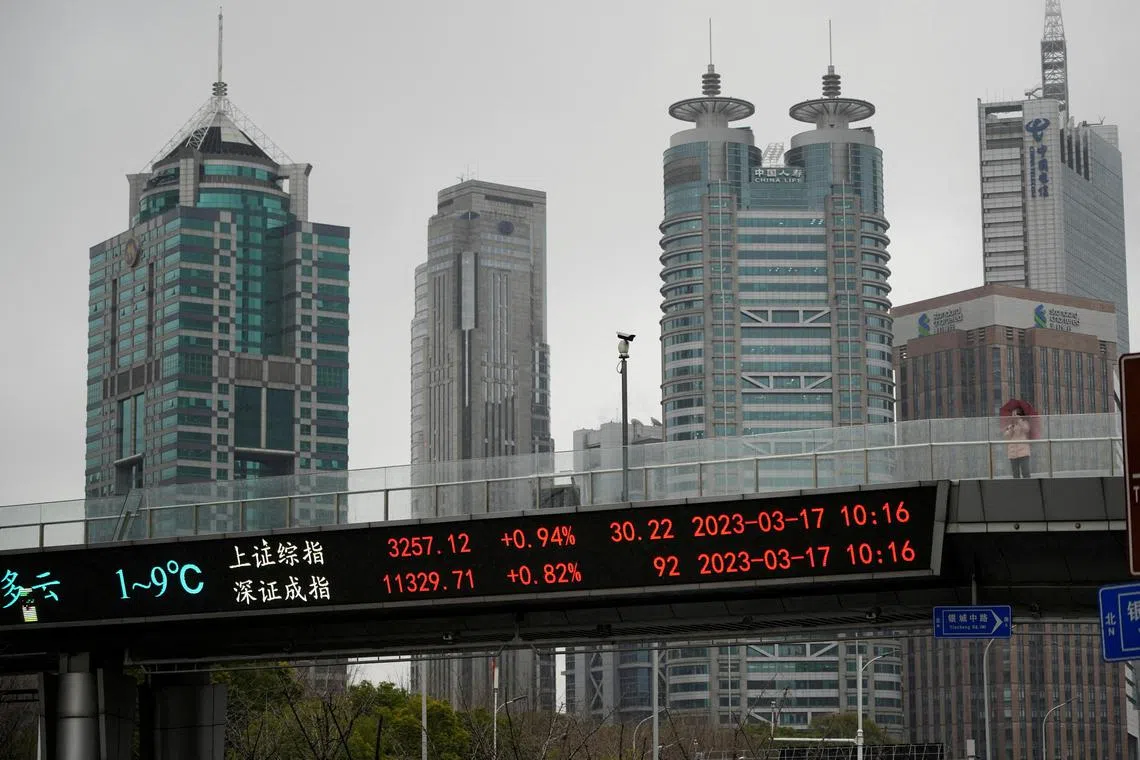China hedge funds in crisis after losses, US investor retreat
Sign up now: Get ST's newsletters delivered to your inbox

The number of active China-focused hedge funds has slipped for the first time since at least 2012.
PHOTO: REUTERS
Hong Kong – Foreign investors are losing interest in China, and hedge funds that target the world’s second-biggest economy are paying the price.
The number of active China-focused hedge funds has slipped for the first time since at least 2012, with only five new funds launched in 2023 as at June, according to data from Preqin. Another 18 funds were liquidated, the data showed.
The contraction marks a major shift for offshore China hedge funds, which accounted for almost half of the new funds in Asia as recently as 2021 as investors sought to ride the wave of the once high-flying economy and capital markets. Beijing’s crackdowns on private companies after-school tutoring
“We definitely see less demand for China managers from both Asia and foreign investors,” said Mr Otto Chan, head of portfolio management at Persistent Asset Partners, a 21-year-old hedge fund firm.
Dantai Capital shuttered its flagship Greater China hedge fund in 2023 after concluding that its investment strategy no longer worked in the current market environment. Tiger Management-backed Yulan Capital Management also liquidated an Asia hedge fund focused on Greater China in late 2022, according to a newsletter.
China-focused hedge funds – stock pickers, in particular – are facing an unprecedented second consecutive year of losses, according to Eurekahedge data. More than two-thirds of China-focused hedge funds lost money in 2022, while 36 per cent were down a fifth or more. In the first half of 2023, 62 per cent of China funds failed to make money, Preqin data showed.
China’s economic recovery is losing steam despite Beijing’s recent policy support, while geopolitical tensions with the US are showing little sign of letting up.
Managers put on a brave face in public, touting the country’s long-term growth potential and cheap valuation. In private, they bemoan the end of offshore China hedge funds, those that raise money from international investors to trade securities related to the country, said one of them.
Legends China Fund dropped 16 per cent in the first seven months of 2023, after more than 20 per cent losses in each of the last two years, according to a newsletter and a source with knowledge of the matter. Blue Creek China Fund was down 17 per cent in the first half, struggling to end a losing streak that began in 2021, according to its June newsletter.
Certain shared characteristics of offshore China funds made them particularly vulnerable to the latest regulatory and geopolitical headwinds.
Investors are seeing more political risks for their China investments and have become less confident about the long-term economic upside, said Mr William Ma, global chief investment officer of Grow Investment Group, a Shanghai-based asset manager backed by Julius Baer Group.
Some investors who have been hurt by their China exposure for two years are waiting for a market rebound to reduce their holdings. With North American pensions scaling back existing allocations or putting future plans on hold, other investors are wary of being caught in the path of these outflows, said another long-time investor in Asia hedge funds, who asked not to be identified because of the political sensitivity of such comments.
Shifting tactics
Facing this existential crisis, China managers are trying to adapt.
In the last three years, APS Asset Management, which oversees US$2.1 billion (S$2.8 billion) in China long-short and long-only strategies, has seen tepid interest from North American backers, especially among the public pensions, said president Ken Chung.
The Singapore-based company has in recent months redirected capital-raising efforts to include the Middle East and South Africa. In the first half, it scored its maiden investors from these two geographies.
“We’ve grown up in a world where it’s a US-led global world order,” said Mr Chung. “Going forward, it will be a two-sun solar system. One is US-led, one is China-led. And there will be planets that revolve around either one.” BLOOMBERG


